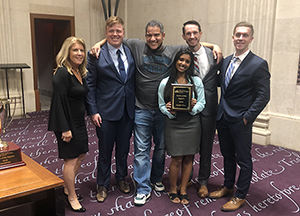The law school hosted the inaugural Battle of the Experts, a mock trial competition that focuses on the critical role of expert witnesses, Oct. 6-8.
Cumberland School of Law won, and Pacific McGeorge School of Law took Second Place in the competition, which featured a fictitious 1998 murder case that resulted in a hung jury. The competition required law students to retry the 20-year-old case, citing evidence developed through electrostatic fingerprinting, a forensic technique that did exist when the defendant was first charged.
The retrial focused on testimony by forensic experts upon which both the prosecution and defense rely, giving advocates on both sides ample opportunities to raise doubts about the evidence presented by opposing counsel’s specialist.
In the final round, Cumberland—acting as prosecutor—elicited testimony from a board-certified forensic analyst that electrostatic fingerprinting revealed a 14-point match with the defendant. Representing the defendant, Pacific McGeorge noted that the expert made her comparison visually, ignoring more objective computer-based technology, which a defense expert observed rendered a much weaker 9-point match with the defendant.
In addition to Cumberland and Pacific McGeorge, 12 other law schools with strong mock trial track records took part in the competition:
- American University Washington College of Law
- Baylor University Law School
- University at Buffalo School of Law
- Campbell University Norman Adrian Wiggins School of Law
- Drexel University Kline School of Law
- Faulkner University Thomas Goode Jones School of Law
- Fordham University School of Law
- Loyola Marymount University Law School
- University of Missouri-Kansas City School of Law
- Pace University Elisabeth Haub School of Law
- St. Mary’s University School of Law
- Temple University Beasley School of Law
 Kline School of Law 2Ls Michael Fitzgerald, Ragha Narasimhan, Zachariah Sigda, and Robert Waeltz coached by ‘16 alumnus Tony Alvarez and ’16 alumna Hannah Molitoris, took Fourth Place honors. And Narasimhan received the "Outstanding Advocate" award, based on her Third Place performance among the 56 competitors in the preliminary rounds.
Kline School of Law 2Ls Michael Fitzgerald, Ragha Narasimhan, Zachariah Sigda, and Robert Waeltz coached by ‘16 alumnus Tony Alvarez and ’16 alumna Hannah Molitoris, took Fourth Place honors. And Narasimhan received the "Outstanding Advocate" award, based on her Third Place performance among the 56 competitors in the preliminary rounds.
In addition to the emphasis on expert testimony, the competition featured a distinctive judging process in which each round of competition was evaluated by a trio of coaches whose teams were not taking part in that round. Competition rules prohibit coaches from sharing insights with their own teams about rivals they may have observed and judged.
“It’s a little unusual, but it ensures that the judges know the case file,” said Abbie Heller, assistant director of the Trial Advocacy program.
The final round was judged by Professor Joseph Lester, director of advocacy programs at Faulkner University School of Law, Patrick Meacham, a partner at Parker Poe in Charlotte, North Carolina and adjunct professor at Campbell University and Steven Epstein, a partner at Barket Epstein and an adjunct professor at Pace School of Law.
“We are incredibly indebted to Justin Bernstein, who came up with the idea for this competition when he was a member of our faculty and remained deeply involved, even after becoming director of trial advocacy at UCLA,” said Professor Gwen Roseman Stern, director of the Trial Advocacy program. “He travelled all the way from California to run the competition with us, which was so very generous of him.”